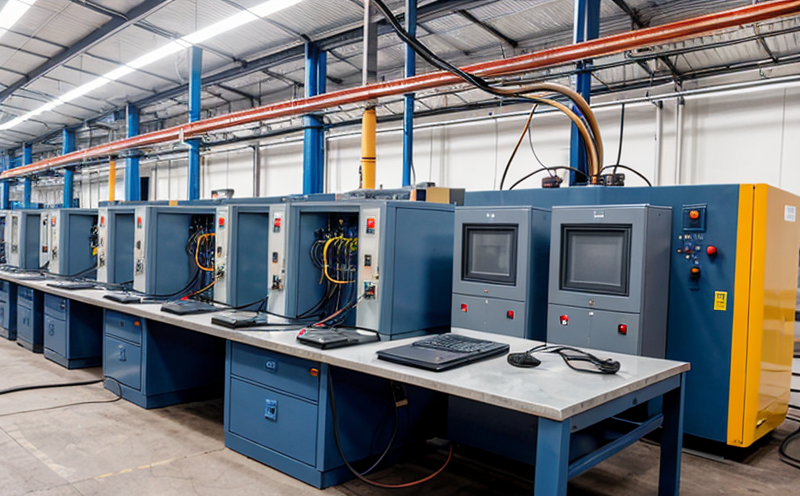IEC 61000 Electromagnetic Compatibility EMC Testing
The IEC 61000 series of standards provides a comprehensive framework for ensuring that electronic and electrical equipment operates correctly in its electromagnetic environment without causing unacceptable interference to other systems. This testing is critical in industries such as industrial manufacturing, where complex control systems are integral to production processes.
Industries like automotive, aerospace, and power generation rely on robust and reliable electronic systems to ensure safety, efficiency, and compliance with international regulations. IEC 61000-4-3 specifically addresses the electromagnetic compatibility (EMC) of electrical equipment in industrial environments, ensuring that products meet stringent standards for immunity and emissions.
The testing process involves exposing the equipment under test (EUT) to various electromagnetic interference sources and measuring its response. This includes evaluating how well the EUT can function when exposed to electromagnetic fields without causing harmful effects on other devices or systems in close proximity.
For industrial manufacturing facilities, this means ensuring that sensitive control systems are not affected by nearby motors, transformers, or other equipment generating electromagnetic interference. By adhering to these standards, manufacturers can enhance product quality, reduce downtime, and ensure long-term reliability of their products.
The testing process typically involves several stages, including:
- Identification of the applicable IEC 61000-4-3 requirements
- Preparation of the test specimen according to industry best practices
- Conducting emission and susceptibility tests in controlled environments
- Analyzing results against specified acceptance criteria
- Generating detailed reports outlining findings and recommendations for improvements
The standards provide a robust framework that helps manufacturers design, test, and manufacture products that meet the highest levels of electromagnetic compatibility. This ensures not only compliance with international regulations but also enhances product performance in real-world applications.
In summary, IEC 61000-4-3 EMC testing is essential for industrial manufacturing facilities to ensure their electronic equipment functions correctly within its environment and does not cause or suffer from electromagnetic interference. By adhering to these standards, manufacturers can enhance the reliability and performance of their products, leading to improved operational efficiency and reduced maintenance costs.
Applied Standards
The IEC 61000 series is widely recognized as a global benchmark for electromagnetic compatibility (EMC) testing. Specifically, IEC 61000-4-3 focuses on the immunity and emissions of electrical and electronic equipment in industrial environments.
The standard covers various aspects of EMC testing, including:
- Electrostatic discharge (ESD)
- Radio frequency interference (RFI)
- Magnetic field strength
- Transient phenomena on power supplies
These tests are designed to ensure that equipment performs reliably in environments where electromagnetic interference is present. The standard specifies the test conditions, measurement techniques, and acceptance criteria for each aspect of EMC.
The application of these standards ensures that industrial electrical and control systems meet the required levels of immunity and emissions. This is particularly important in industries such as automotive manufacturing, where sensitive electronics must operate correctly even when exposed to harsh electromagnetic environments.
Why Choose This Test
Choosing IEC 61000-4-3 EMC testing for your industrial electrical and control systems is a strategic decision that offers numerous benefits:
- Enhanced Product Quality: Ensuring that your equipment functions correctly in its intended environment reduces the risk of product failures, leading to higher customer satisfaction.
- Compliance with International Standards: By adhering to these globally recognized standards, you demonstrate your commitment to quality and reliability, which is crucial for international markets.
- Improved Reliability: EMC testing helps identify potential issues early in the development process, allowing for timely corrections before product release.
- Reduced Downtime: Ensuring that equipment operates reliably in its environment minimizes the risk of unexpected failures, reducing downtime and associated costs.
- Competitive Advantage: Meeting rigorous EMC standards can differentiate your products from competitors, enhancing brand reputation and market position.
In addition to these benefits, IEC 61000-4-3 testing also provides a structured approach to identifying and addressing potential issues in industrial electrical and control systems. This ensures that your equipment meets the highest standards of quality and reliability, providing peace of mind for both manufacturers and end-users.
By choosing this test, you are investing in the long-term success and reputation of your products, ensuring they meet the stringent requirements necessary to operate safely and effectively in industrial environments.
Competitive Advantage and Market Impact
Adhering to IEC 61000-4-3 EMC testing offers significant competitive advantages that can enhance your market position:
- Global Recognition: Compliance with internationally recognized standards such as IEC 61000-4-3 ensures that your products meet the highest quality and reliability benchmarks.
- Enhanced Reputation: Demonstrating a commitment to quality through rigorous testing can enhance your brand reputation, making it more attractive to potential customers.
- Increased Customer Satisfaction: By ensuring product reliability and performance in challenging environments, you increase customer satisfaction and loyalty.
- Market Differentiation: Meeting stringent EMC standards can differentiate your products from competitors, offering a unique selling point that can attract more customers.
- Regulatory Compliance: Adhering to international standards ensures compliance with regulatory requirements, opening up access to new markets and opportunities.
The impact of IEC 61000-4-3 testing extends beyond individual products. By ensuring that your industrial electrical and control systems meet the highest standards, you contribute to a safer and more reliable industrial environment. This not only enhances your reputation but also fosters trust among stakeholders.
In conclusion, choosing IEC 61000-4-3 EMC testing is a strategic decision that can significantly enhance your competitive advantage and market position by ensuring product reliability, compliance with international standards, and enhanced customer satisfaction.





